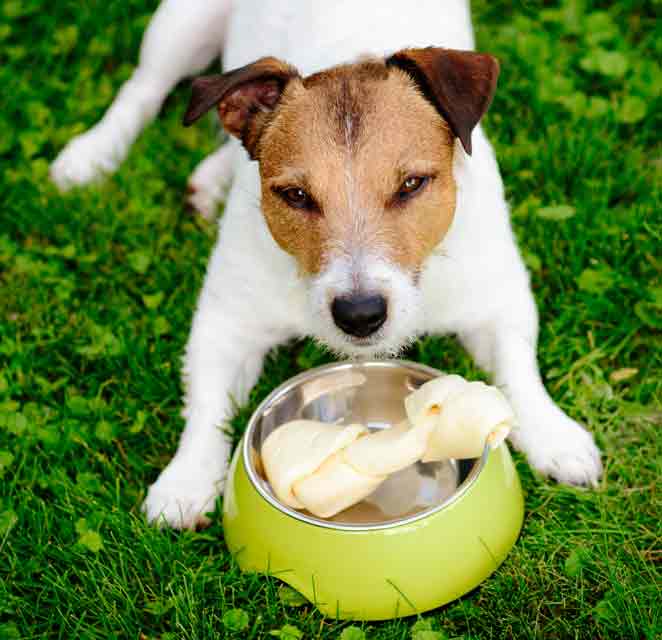What to Do About Food Guarding in Dogs

Food guarding in dogs is part of a more general situation called resource guarding. In the wild, dogs will, to some extent, defend their resources from humans, other dogs, and other animals. Those resources could include food, mates, and living space.
For some domesticated dogs, the urge to protect resources can still be there, and it may manifest as guarding food, treats, favorite toys, humans, or bedding areas. Often, food guarding behavior is triggered when a litter is all fed from one communal bowl, and the puppies end up scrapping with each other to get their fair share.
Signs of Canine Resource Guarding
Dogs that are guarding a resource might show all or some of the following behaviors:
- Grabbing and retreating with the item.
- Growling at an approaching person or animal while standing over or in front of the object.
- Snapping, biting, or chasing a person or animal who gets too close to the guarded item.
Some dogs only guard certain things, such as one favorite toy or their food dish. Others guard everything they consider to be theirs.
How to Treat Resource Guarding in Dogs
If a dog only guards a specific thing, such as food, and there are no children or visitors in the home when the dog eats, some people do not treat the issue. Instead, they use caution when feeding the dog, stay away while he's eating, and sometimes even feed him in a closed area like a large dog crate or a small room.
However, if there are children around, visitors frequently come during feeding times, or the dog guards more things than just their meals, trying to manage the problem in that way is probably not an adequate response. Kids, especially, are at risk when a dog exhibits guarding behavior because they are less likely to respect a dog's space or recognize signs that the dog might become aggressive.
Treatment of resource guarding in dogs can be difficult and even dangerous. If you are at all concerned that your dog might bite you, don't proceed with treatment yourself. Instead, ask your veterinarian for a referral to a behavior specialist for individual help.
The main idea of treating resource guarding in dogs is desensitization. In other words, training the dog that it isn't necessary to defend his things. Let's take the case of food guarding as an example.
Desensitization for canine food guarding involves very gradually moving closer to your dog while he eats. You start out across the room. While he's eating, say something to him and toss a treat into his bowl. Do this periodically while he eats. Don't give him a treat if he approaches you—only if he's eating out of his bowl. Over time, move closer as your dog accepts it. If he growls of becomes defensive, move back to the previous distance for a little while.
The reason this type of therapy works is that you're teaching your dog that people approaching him while he eats is a good thing. They bring tasty treats and do not take away his food.
Once your dog is comfortable with you approaching while he's eating, have any adult who might be around while he's eating repeat the procedure. Just because your dog becomes okay with one person approaching his food doesn't mean he'll be okay with everyone doing it.
You must still keep children away from your dog while he's eating, even once you're reasonably sure he's okay with adults approaching.
If Possible, Use Prevention Instead of Treatment
Preventing the development of resource guarding in your dog is a better approach than trying to treat it once it occurs. Sometimes, that isn't possible, but keep it in mind if you get a new puppy or older dog and use the following tips:
- Feed your puppy or new dog pieces of kibble from your hand once a day, giving him praise when he is calm and happy about taking it.
- Once your dog is calm about eating from your hand, feed him from a bowl in your lap once a day.
- When your dog is eating from his bowl on the floor, drop tasty treats into it occasionally he's eating.
If your puppy or new dog shows signs of not being comfortable with you handling his food, stop and use the desensitization techniques above.
Remember, don't risk being bitten. Use care when dealing with canine resource guarding and seek help from your veterinarian as needed.
You May Also Like These Articles:
Why Does My Dog Sometimes Dig at the Carpet
How to Stop Your Dog from Jumping on People
Why Do Dogs Chase Their Tails?
Disclaimer: This website is not intended to replace professional consultation, diagnosis, or treatment by a licensed veterinarian. If you require any veterinary related advice, contact your veterinarian promptly. Information at DogHealth.com is exclusively of a general reference nature. Do not disregard veterinary advice or delay treatment as a result of accessing information at this site. Just Answer is an external service not affiliated with DogHealth.com.


